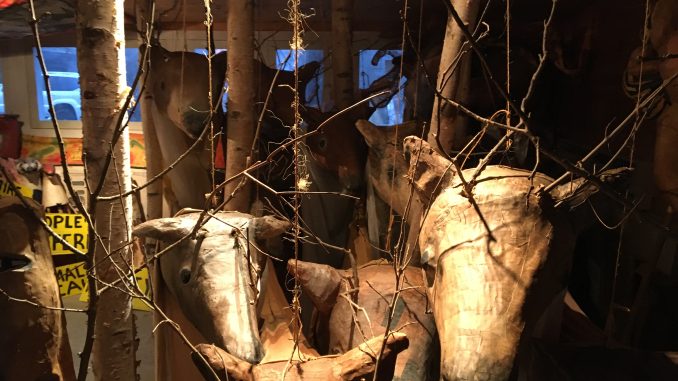
In the heart of Rosendale, across from the Rosendale Theater on Main Street, sits the Redwing Blackbird Theater — a workshop, community space and home to a vast array of puppets. Founded in the late 1990s by Amy Trompetter, owner of the theater, renowned puppeteer and activist, the company’s work has spanned both locally and globally, from their protest marches in Kingston to large-scale performances in Germany. The main base of operations, however, still resides in that very workshop.
Walking into the space, the floor opens up to life-sized puppets, papier-mâché tiles and large banners from previous campaigns and protests decorating the walls. Progressing through the workshop, wooden workstations are covered with papier-mâché figures, still in the process of drying and being painted. Past the workstations lies a communal space complete with a kitchen and stove top fireplace for people to sit and chat. The multi-functionality of the space is intentional by design; as Trompetter said, “the building affords everything that [they need].” From community space to gather and discuss current events over miso soup, to a workshop for bringing puppets to life, the Redwing Blackbird Theater’s purposes are multitudinous.
Trompetter originally got into the scene through the Bread and Puppet Theater in New York City — “one of the oldest, nonprofit, political theater companies in the country,” whose early work protesting the Vietnam War involved “block-long processions and pageants.” Prior to coming to New York, Trompetter attended UC Berkeley during the Free Speech Movement, a mass campus protest starting in 1964 against the university’s policies prohibiting on-campus political activities. This exposed Trompetter to the true scope of free speech and what it could look like in her own life.
Upon graduating and moving to New York, she stumbled upon the Bread and Puppet Theater during one of their many protests, recalling her attendance and being encapsulated by the “repeating scenario” of drumbeats and live performers falling to the ground, combining performance and activism together. Bread and Puppet’s work would become Trompetter’s calling, as she dedicated her life to combining puppetry and activism within the community. “Speaking on art,” Trompetter explained, “[Art] allows people the visuals…to come to something within themselves, the way you would hope art does unlock something in a person…so that they come together and find solutions, deeper truth within them and the courage to be visible and public and verbal.”
Trompetter and her theater’s art can not only be found in the workshop, but in the Puppet Museum, behind the main building and adjacent to the Rondout Creek. The Museum shows the many different performances of the company’s past — from large-scale shows to local protests — with large deer puppets nestled right near the entrance, familiar faces from a recent protest.
The theater company came to SUNY New Paltz Feb. 28, joining the pro-Palestinian protest with life-sized deer puppets meant to symbolize peace. They were initially contacted by Naomi Allen, a member of Women in Black, who encouraged local activist groups to support the student protestors, according to Trompetter. The deer were not made specifically for the event and were rather puppets they’ve had in store. The use of deer was inspired by the values of the Sámi women — an Indigenous population situated across the Arctic regions of Scandinavian countries, whose women-led community advocates and fights for the existence of their culture and land. The Sámi people have declared their full support of Palestine’s liberation, empathizing with their struggle as an indigenous group. Al Jazeera spoke with Ella Marie Haetta Isaken, a Sámi activist, who said, “…Indigenous peoples all over the world have stood up for the Palestinian people, because our bodies know the pain … ” Those last five words were ones that stuck with Trompetter, as she touched upon her inspiration from the Sámi women and their reindeer for the theater’s own protest deer.
One important component of protest and activism that is integral to the theater is showing up and being present offline. Trompetter noted that though the current generation’s activism online is very effective, she also encourages those groups to “[step] out of the private space to the public.”
The Redwing Blackbird Theater largely engages in public demonstrations, bringing art to life and engaging with the community face-to-face. She encourages new generations to “join your neighbors and the neighbors who don’t agree with you, too. [Find] out how to make consensus and how to not go off the deep end.” Being effective activists within local, national and global communities can only be achieved if people bring the same amount of energy both online and offline — showing up, voicing concerns and making a larger impact overall.
While the Redwing Blackbird Theater’s activism continues, they are also returning to, revising and revamping an earlier performance, Unveiling the Vortex, on May 5 at the Rosendale Theater. It is a free event that tunes into the lives of three Hudson Valley women — Sojourner Truth, Hanna Arendt and Sunksqua Mama Nuchewe — and the activism they engaged in during their time, as well as their legacy. The play, originally performed at Academy Green Park in Kingston, touches upon many of the tragedies and oppressions these women faced and serves to inspire hope, “in a population inheriting worldwide ecological disaster, nuclear escalation and severe wealth inequality,” according to their website. The theater is working with local historians such as Evan Prichard, Micmac native and regional historian aiding in the research of the Esopus tribe and Nuchewe, to truly encapsulate and tell their stories to the fullest. Trompetter encouraged all to attend the performance.
Leaving the workshop, there was one final piece — a familiar banner on the wall which spoke to the true crux of Redwing Blackbird Theater’s message, a message that New Paltz students saw on Feb. 28 — “Security Through Peace, Not War.”
To stay updated on upcoming events, shows and community gatherings, follow @redwing.blackbird.theater on Instagram and Facebook.
